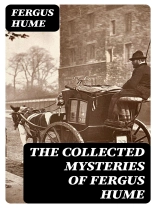In ‘The Collected Mysteries of Fergus Hume, ‘ the reader is invited into a labyrinthine world of crime, intrigue, and moral complexity. Hume, a pioneer of the detective genre, showcases his adeptness at intertwining suspense with richly drawn characters in a series of compelling narratives. The collection serves as both homage and commentary on the Victorian fascination with mystery and the uncanny, all while employing exquisite prose that elevates the genre beyond mere sensationalism. Hume’s nuanced plots often reflect societal undercurrents, revealing how crime, class, and morality intersect in Victorian England, providing a holistic reading experience. Fergus Hume, an underrated yet significant figure in the world of crime fiction, was born in 1859 in England and later emigrated to Australia. His early exposure to the diverse societal fabric of both countries undoubtedly shaped his literary voice, steering him towards themes of injustice and the complexity of human nature. Hume’s breakout success, ‘The Mystery of a Hansom Cab, ‘ solidified his reputation and established him as a leading storyteller during an era marked by rapid social change and urbanization, making his insights deeply relevant. ‘The Collected Mysteries of Fergus Hume’ is not merely a compilation of tales; it is an essential exploration of the foundations of detective fiction. Readers who seek a sophisticated interplay of intrigue and eloquence will find Hume’s work a perfect addition to their literary repertoire. Delve into this collection to experience a transformative journey through the realms of mystery, where every page offers a glimpse into the shadows beneath Victorian society.
Sobre o autor
Fergus Hume, born Fergusson Wright Hume on July 8, 1859, in England, was a prolific author whose literary career was sparked by an ambition to surpass the popularity of the detective novels of the day. Hume emigrated to New Zealand with his family in the early 1880s, later moving to Melbourne, Australia, where his writing career took flight. His first novel, ‘The Mystery of a Hansom Cab’ (1886), was an extraordinary success, selling over 100, 000 copies and broadly securing his reputation as a master of the mystery genre. Despite this early triumph, none of his subsequent works ever achieved the same level of acclaim, though Hume continued to write avidly, publishing well over 100 novels before his death in 1932.
Hume’s writing is characterized by intricate plots, a focus on the ‘whodunit’ aspect of mystery stories, and the deployment of red herrings to mislead readers. His narratives often revolve around criminal investigations led by a shrewd detective and are set against the backdrop of the Victorian era, with its distinct social mores and legal structures. ‘The Collected Mysteries of Fergus Hume’ encapsulates his oeuvre and underlines his role in shaping the detective fiction genre. While Hume may not have maintained the literary stature of his contemporaries, his work remains an important part of the detective fiction canon and continues to be studied for its significant contributions to the form and evolution of the genre.












